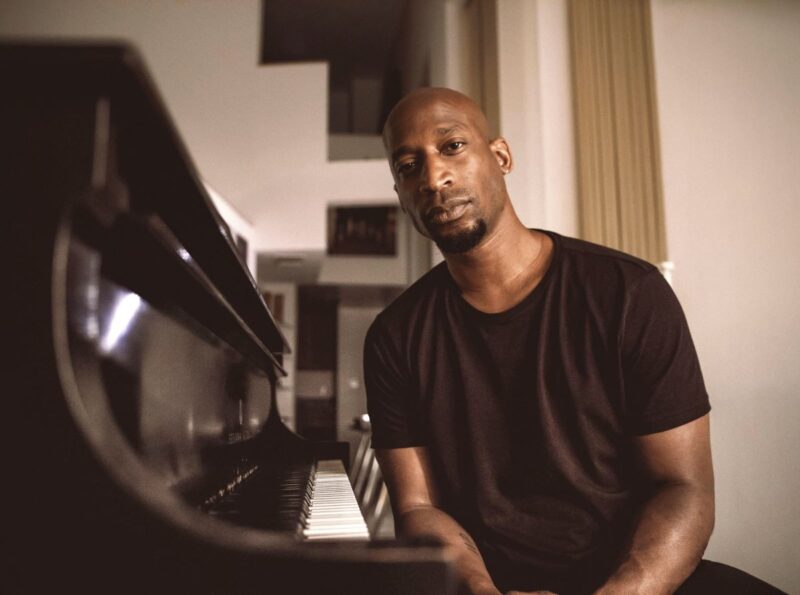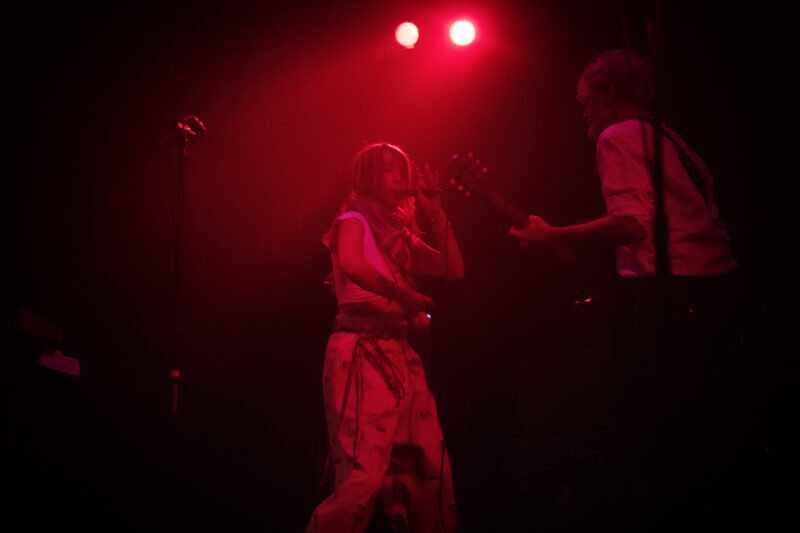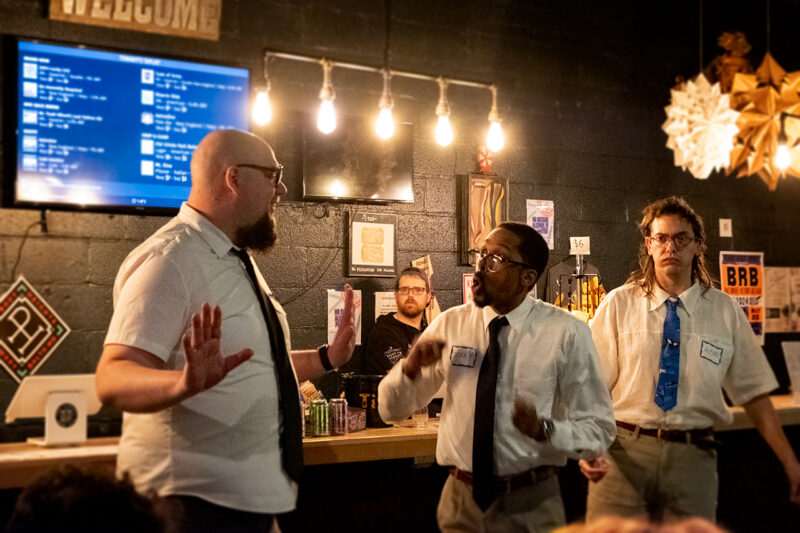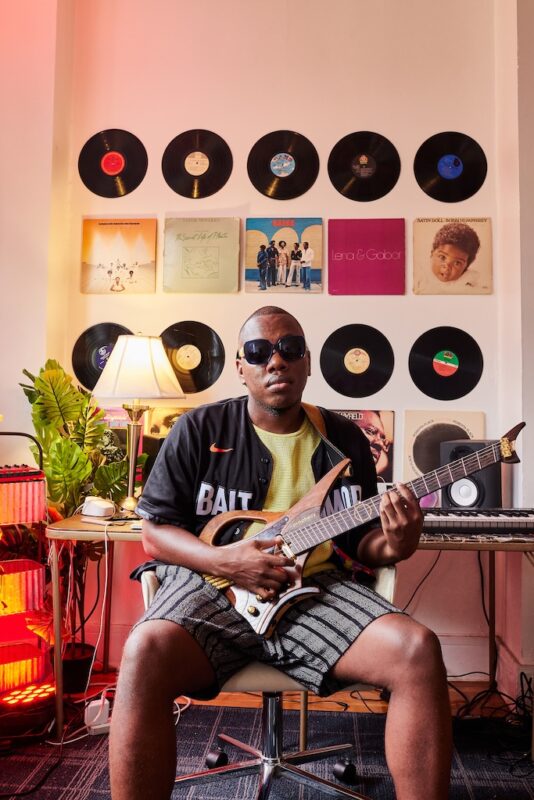I’ll hear her first. Walking along Woodward in residential Queens, the Manhattan skyline is a silhouette in the distance. With a glance at the house number, I slip off the sleepy street, through the vestibule, and down the basement stairs. There sits Ms. White.
She’s just as I’d seen her earlier on my phone: at a piano. A spiral projection glows above her, incandescing against a smattering of house plants, and a disco ball twinkles by her clogs. Rugs are splayed where the warm light recedes. She lights up as I step off the stairs, and rushes to greet me, sheathed in a grey slip dress, her bob ends curling outward, flirtatiously mod.
Baltimore has me well-acquainted with house shows. A six-pack of pumpkin ale swings in its plastic bag by my knees, my coat zipped with no intention of hanging it. I offer her a can; she declines with a smile, wrapping herself in a cardigan as event hosts descend the stairs.
Ms. White has reinvention on her mind. She is due to headline the bustling Williamsburg mainstay Baby’s All Right, but tonight expects a cozier affair, perhaps with some live-streamers tuning in. As a host queues her for testing levels, she confides in me that she’s itching to play her latest, unreleased material.
But didn’t she just drop an album? First was 2017’s Jade, titled after the middle name of her much-beloved Amy Winehouse. Then, on the 8th of November, her second album was released on the anniversary of her starting hormone therapy. For this EP, the name is hers.
As I lounge off to the side, her jazzy alto croon settles, for now, into the familiar. Other than a host setting out chairs, I’m her audience of one. I think back to the fields and stages we’d shared as Baltimore County schoolmates when we were younger. Her future is assuredly bright. While it’s just me, I enjoy the mic check, sitting with Marina.
A week later in Greenpoint, I interrupt Ms. White’s late-evening catch-up with an old college friend. I’ve again brought beers for her to decline, along with a list of questions charting her path from Maryland band geek to sultry songwriter on the rise.
Charlie Janelle: On the title track of your EP, Marina, you reminisce about young love. Can you not run from your high school self fast enough, or do you now feel nostalgic for those years?
Ms. White: I don’t want to lose that person I was. I had a really good time. That was the best version of myself in terms of my relationships with people, and my zest for life. I lost it, and I want it back. “Marina” was about, what if I welcome myself back again?
When I started transitioning, several people I knew took an interest in me. I had assumed the worst, that coming out as a trans woman I couldn’t be making a worse decision for my love life. And it actually was fine. When I was in high school, it was a rush, having these little flings. I thought I was about to remove myself from that, and have this sexless existence. Or, at least, if I did have sex, it would be incognito and weird, this flawed system. I was like, I can still have this.
In your short film Who is Marina? you describe writing Marina as a fantasy character until she became your reality. How did you first conceive of Marina? How did you envision her?
I was imagining a life without so much anxiety. At the time I was early on in my transition, and still on SSRIs. I was like, am I just going to be taking pills my whole life? One day, hopefully, I’m able to live by the water on some beach and just chill the fuck out, and not be hustling 24/7.
I was into a lot of bossa nova and chill jazz, and smoking a ton of weed. I was like, what if I was wearing the same maxi dress every day, and have super long hair? At rock bottom, that was what was appealing to me, being an ad for some resort wear collection.
I wanted to get to a point in my transition where I wasn’t having to think about it all the time. Marina was this concept of this person I’d be when I get my shit together. Some hippie lady living on the beach—if I’m on one end of the spectrum, I had to imagine the opposite. Marina was a fantasy that I made up to inspire myself.
My first thought is Sasha Fierce, Beyoncé’s stage persona.
I have this inner motto: be the person. Be the person that’s in your head. You’re not going to go sleep and wake up as that person, you have to actually do it, and it’s so much harder than it seems.

So much of this obviously can be in reference to gender transition, but I think everyone aspires to something greater. Transitioning is a way to make explicit what everyone struggles with. Who are we going to be a year from now, five years from now?
I’ve had this conversation quite often; I feel like everyone goes through a transition in some sense. Some people never figure it out, or refuse to, and are worse off for it. I have close friends who are stuck. It’s always the straight white dudes.
It’s like transitioning is a primer for making grand life changes for the better.
Yeah!
Maybe those who are struggling to evolve don’t yet know how.
Because they never had to. My friend doesn’t know that there’s a way out, or a better thing to do. It may not be easy, but if you’re not happy, generally there’s a way to change it.
You’ve said that Marina is an attempt to fuse your on- and off-stage personas. Do you feel like you’ve fused the two together?
There’s always a distance, but my hope is that I’ll get closer and closer. I definitely have to think about being trans, but it’s not the first thing I think of when I wake up. I’m back to normal, I feel like myself again. At some point, I’d lost myself. I was being the worst for no reason, and using being young as an excuse to not have a handle on shit.
What vices were you indulging?
In college, drinking got bad. I started to get vocal damage because I was getting reflux and was still singing, and losing my voice. My new rule is that I only drink at weddings. I was usually being the worst to myself, and occasionally other people were collateral damage. I was so in my own head, I couldn’t even think about other people. It was me, me, me all the time.
You’re finally able to look outward.
I made the analogy, and my therapist said it’s pretty common, that if your brain is like a dirty room, you can’t make use of it, and you can’t genuinely focus.
Changing gears: earlier today you sent me a GIF your friend made of you tripping in a marching band show. How did your teen years as a saxophonist and jazz musician inform your music today?
See, I wasn’t a jazz musician, though. I was so classically trained! Even to this day, I consider myself a jazz musician, but I use the term loosely. I like people who inject a jazz mentality into a genre. Amy Winehouse was like, I’m going to write jazz songs, and mix them directly with hip-hop. If you play them on piano they sound like jazz standards, but elsewhere they sound totally different. In high school, I was really into Stravinsky, the orchestral shit.
The grade 5 and 6 pieces you play for ensembles.
When I went to Maryland All-State Band my sophomore year of high school, it was the most game-changing thing because of this composer, Sam Hazo. A particular song, Psalm 42, was all whole and half notes. He called out how none of us had practiced this song, and how it’s actually the hardest song to play because you have to make it interesting. There was this one particular run during a rehearsal where I thought, “That is the craziest thing I’ve ever heard in my life.” To this day, I haven’t felt that feeling.
Piano and singing, I’ve never seriously studied either of those things, but saxophone I studied. It gave me this mentality for how to think about music. Being a saxophone player, you have to fit into a band of one hundred people. Now when I’m on stage, it’s just me, but I still feel I’m applying that. How are you going to make the slow, pretty song interesting?
It’s easy to play “Candy Heart” and for it to be so boring. I have friends who make music and I go to their shows, and I’m like, this song is the same thing for four minutes, and you’ve lost everyone.
You see yourself as a system, even when you’re solo.
That’d sound obnoxious if I said it. You can say it, but I can’t. I’m really conscious of all parts. But I do put a lot of emphasis on my vocals. And I will also say that my vocal sound is very much akin to an alto saxophone. Amy Winehouse, in an interview, said Ella Fitzgerald wanted to sound like a clarinet, and Amy was like, I’m a trumpet.
I’m working to feminize my voice, and alto saxophone is attainable in terms of a timbre. It used to be tenor sax, then I was like, no, I think I can do an alto. And my vibrato vocally is similar to my alto sax vibrato. Weirdly enough, I play saxophone the least out of anything, but I use a lot of those skills.
My senior year of high school, my friend and I made an a cappella group, and I was like, this is more in line with what I’m interested in. So I went to college and did a cappella, and started writing music. You can’t write lyrics for saxophone.
One of my favorite lyrics from the new EP is in “Pink Flamingo”: “Nothing’s worth more than knowing you could know more.” What inspired that line?
My friend’s dad told me this story about how when he was a kid he would steal garden gnomes from people’s yards and leave ransom notes. I loved the concept. It was so insidious, where you want something so badly you take it for yourself. Instead of a garden gnome I wanted it to be a flamingo. It’s very literal!
Later we went back in the studio for the second verse. It was instinct: I felt that way about being a girl too. There was something better for me, and I didn’t know what it was.
Sexually, I felt it the opposite. People want trans women so badly. They’re willing to be violent, to take advantage of somebody’s body and abuse them because they don’t know how to deal with their own desire.
On 2017’s Jade, you were proclaiming, “Fuck Men!” In 2019, men are still infuriating, but you’re admitting you are “Jaded.” What roles do romance and openness play in Marina?
The openness with Marina came with the openness to myself. I was declaring “fuck men” because saying all men are bad was the only explanation I could come up with as to why nobody loves me.
With “Jaded,” I was digging deeper. If I’m never going to get married, or be with anybody, what would I do? My dad has been doing a pretty good job with that. My mom died and he’s fine now, he’s happy. He’s perfectly comfortable by himself. I would love to get to that point.
“Candy Heart” is the song where I came into myself as a woman and who I felt like I was. That is the greatest treasure to me right now. For the most part, this album passes the Bechdel test. Marina is about me.

There’s a bittersweetness to “Old Man Charlie,” an ode to your father, in which a parent and child struggle to connect without hurting each other. Has your father heard the song? How did he react?
He’s heard the first version, and hasn’t heard it since. I think he’s largely forgotten about it. The first thing he said was, “Charlie? Nobody calls me that. You’re making me sound like some old fart!”
I’m kind of nervous about reminding him it exists, because it has a much different context now. Back then, he would ask me if I’m fine and if I have enough money, and that was the extent of our relationship. I wrote that song feeling like I can’t tell my dad anything, or say I love you. When a single parent never says “I love you,” you never learn that it’s normal.
My dad was basically the caretaker for all of his siblings when he was a kid. His dad died young, and his mom was abusive and an alcoholic. He took his siblings to Baltimore. He’s not even the oldest, he’s a middle child, you know boomers. He has, like, eight siblings.
*Laughs* My dad has 12.
OK, boomer! So yeah, he took them to Baltimore. About my mom, he told me, I don’t know if we were in love, but I knew she needed someone to take care of her.
He cares for me. He’s really good at being a dad, but his emotional capacity—it turns out he has it, but he doesn’t understand how to express it, so I have to get it out of him. Over a phone call, I asked him, “Dad, why don’t you tell me you love me?”
What did he say?
“Of course I love you, it just doesn’t sound right. I can’t say it. I don’t feel like it’s genuine, like it means anything when it comes out of my mouth. I don’t say it to my sister. She says it to me, and I can’t say it back.”
And I get that. No one told it to him when he was growing up. I can’t fault him past a certain point, because I now realize what I’d be like if that had been my story.
Notably, I didn’t say it back to him. I thought, I’m going to say it, and it’s not going to sound right. I’m going to have to get there too.
This reminds me of a quote by Haruki Murakami, from a personal essay of his. “This heavy weight my father carried—a trauma, in today’s terminology—was handed down, in part, to me, his son. That’s how human connections work, how history works: an open wound for both of us.”
It’s this never-ending loop. This generation is coming to terms with mental health, and breaking the cycle. I don’t want my kids to be like this.
It’s promising to think that. It could mean great things for the future.
I do the same things for my friends. If I’m trying to express that I love them, I’m taking care of them. It’s my love language. Like, I’ll buy your ice cream.
I have the inside scoop that you reincarnated the music video for “ Jaded.” A former version exists in the ether, with footage of a cluster of friends dancing behind you. I may or may not have been one of them. In the final version, it’s just you by your lonesome, relishing the night. What inspired the revamp?
The first shoot was off-the-cuff. The song wasn’t mixed yet, it was just a draft. Then, I decided I wanted it to be a solo, “Call Your Girlfriend”-esque music video. There’s a history of women making those, and I thought, I want one!

You said on Instagram that Marina “came to life through sobs, laughs, panic attacks, eye rolls, and gritted teeth. Sometimes I feel these things are largely where I come from, deep down.” How do your vices and vulnerable spots inspire your songwriting?
I mean, that’s kind of all it’s about, right? I think people’s vices are a byproduct of what they care deepest about. I was drinking because I felt lonely; it all traces back. If you’re writing a good song, you’re manifesting a vice.
It’s so easy to make bad decisions. What if I started to make good ones? Songwriting has turned into that for me. Rather than deciding I’ll smoke or drink, if I’ve been upset all day and don’t know where to put it, I’ll sit at my piano and see what happens.
Theo Shier has been your producer for quite a while now. How would you describe your working chemistry?
Our relationship is complementary. I’m analytical, taking this scientific role. This chord progression and these lyrics are good, objectively. I think this is good because of the data I’ve collected on other good songs.
Theo’s like, but does that feel good? When you hear it, do you like it? Left to my own devices, I lose that sometimes. And he’ll ask, what if this had a little more life? It needs something, its je ne sais quoi.
It was the first show I ever played in New York where I met him. It was such happenstance. My future manager was who asked me to do the show. I played two shows in college, and that was one of them.
I was reluctant to work with him at first because I didn’t know what I wanted to write yet, and he’s this straight dude. I didn’t know if we were going to relate to one another, I was nervous. Making music is such a vulnerable thing for me.
When I started transitioning, I posted it on Facebook, and didn’t talk to him about it. A couple weeks later, in the studio, he sat me down, and asked, “What’s going on? You don’t seem right. I don’t know what it is, but I feel like you’re shutting me out and I don’t want that to happen.”
I sobbed for 45 minutes. He broke the ice. I let my own insecurities get in the way of getting close to somebody. Since then, he’s been so supportive. He’s had to deal with me as a musician, as a person transitioning, We went through our pothead phase together. He’s probably the person that I’m closest to. He sees me through my bad spots, and I see him through his.
We’ve also gone through releasing something and having it do way better than we thought it would. That shift was really tough for both of us. It was something nobody else in our lives had gone through.
What was tough about it?
We’re now making music under pressure. People are asking things of us all the time. Where’s the new album? Where’s the new music? We made music for three years with no intention of releasing it. That’s where Jade came from. With Marina, we have to build the momentum. How do we one-up ourselves?
The struggle of the sophomore album.
Exactly. Luckily, we have room to make mistakes. It feels like a romantic relationship sometimes. When we get in an argument about a song, I feel so bad until I see him again and we can fix it. Then you get to that one session where you think, this is why we work together. Rather than being totally solo, I need that yin and yang sort of thing. I like that you asked about him. Most people don’t. He’s a big portion of this.

Producer Theo Shier and Ms. White
I think of Mark Ronson. People in producer roles have rare moments of superstardom, but so often they are overlooked.
Mark Ronson is actually a really good example. He was so crucial to Back to Black. I’ve read a lot about how that album came to be, and Mark Ronson is responsible for hearing Amy Winehouse’s ideas, synthesizing them, and the next day sending her exactly what she wanted.
He’s like a linguist of music.
Right. Amy said out loud, “They try to make me go to rehab, I say, no no no” and Mark said, that’s the song. And that’s how she got on the map.
Sounds like this makes you appreciate Theo’s role in your music.
For sure. Marina would not be what it is if Theo was not involved. I’m glad that’s the case.
When we chatted at your house show in Queens you mentioned feeling like you quickly outpace and outgrow your own material. What does Ms. White 3.0, the Marina of 2020 sound like?
It’s teen angst written as a late-20s person. I mentioned to you then that I’ve been listening to a lot of Snail Mail, Phoebe Bridgers, Conor Oberst. It’s the album I would have written had my voice not dropped, that I feel like I was robbed of just based on circumstance. I’m letting myself get out these immature feelings. I’m tapping into that part of me that never got to say what I wanted to say.
It’s the first time I’m writing a story. When your mom dies, your whole life is a mix of tones. I have all these feelings rooted in her death that I didn’t understand. I never grieved it, and I recently started. I grew up as a boy, ostensibly, but I lost my mother as a girl.
My therapist suggested this book, Motherless Daughters. There’s a concept that when kids live through a tragedy they throw themselves into something else to distract themselves. While the parents and relatives have meltdowns, you need something to do. That was me with music. It was piano, originally, then saxophone, but it was piano first. I was 8, my mom died and I would not leave my Casio. I was like, I’m going to learn how to play “Pachelbel’s Canon.”
When that happened I was obsessed with ragtime music. As a teenager, I hated it, like nails on the chalkboard. Now, I deeply love that sound. Ragtime turned into honky-tonk, which turned into country pop—early country pop, like Patsy Cline. I’m using moving dominant seventh chords and the circle of fifths like Patsy Cline would, or Elvis, or Brenda Lee, even Dolly Parton. It has this wistful sound to it. I’ll write a Snail Mail jam for guitar, but the chords I’m using are ragtime.
With Theo, once he gets involved, I have no idea. I’m going to sit with him, play them, and say, what do we do? I think it’ll involve more live instruments, live horns. The best way I can describe it is adult contemporary, which I know sounds crazy. I want an unusual statement and story in a traditional package. A lot of those older ragtime songs are like, “I love you, when will you come back to me?” What if, instead, I wrote about how my mom potentially died from medical malpractice?
I’m optimistic, but I’m upset about a lot of things, smiling through gritted teeth. I find it boring to write a sad song that sounds sad. You’re picking one emotion and you’re running with it, but what if you captured all of it at once?
A snapshot of a moment that’s conflicting.
I was so happy as a kid, but I was also crumbling. In music, that’s hard to achieve, but it’s a goal I’ve set. Everyone is everything all the time.
Images courtesy M. Cooper / Flat Pop Records
Charlie Janelle is a writer and filmmaker residing in Brooklyn. Charlie hosts and produces a pop culture podcast, Eat Your Veggies, and is a former contributing writer for the Baltimore City Paper.






